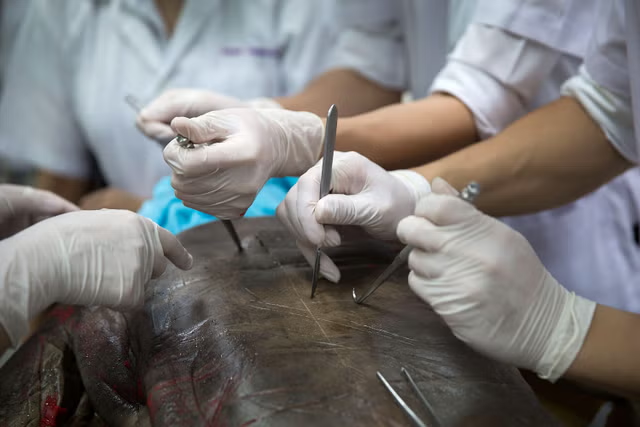Salmon sperm facials have gained popularity as the latest skin-rejuvenating treatment loved by celebrities and beauty influencers alike—but dermatologists told Newsweek they wouldn't try the treatment themselves.
It involves injecting polynucleotides—stretchy molecules taken from fish DNA, usually from the sperm of salmon or trout—under the skin.
"To benefit from polynucleotides, they are incorporated into a polymerized injectable gel, and once injected, this gel binds with water molecules, effectively firming and hydrating the skin," Dr. Gizem Seymenoglu, a facial aesthetics doctor at Longevita in London, U.K., told Newsweek.
"As a result, it reduces wrinkles, diminishes scars and brown spots, tightens pores, and minimizes stretch marks."
The treatment has not been approved by the U.S. Food and Drug Administration (FDA), but Seymenoglu said that the treatment had "an outstanding safety record over a decade."
Seymenoglu added that she injected herself with polynucleotides, under her eyes, every four months, and always recommended it to her patients—but other doctors who spoke to Newsweek did not say the same.
For instance, dermatologist Dr. Hadley King from Dr. Hadley King Dermatology in Manhattan, New York City, said: "I don't think I would try this or recommend this at this time, because neither efficacy nor safety of polynucleotide injections has been established with data from well-designed studies at this point, and they are not approved by the FDA."
King added that hyaluronic acid was often used as the other main ingredient, alongside the polynucleotides, saying: "I suspect that it's the hyaluronic acid that is responsible for visible results, and this is nothing new."
Dermatologist Dr. Connie Yang, of PFRANKMD by Dr. Paul Jarrod Frank, expressed similar views to Newsweek; that, while it may be a popular treatment in Asia, she was reluctant to try it without FDA approval, more regulation, and better safety data.
Yang said: "I'm a huge fan of regenerative medicine, but in its current state, I would not try salmon sperm injections myself—especially when we have alternative treatment options that are safe and FDA-approved to achieve similar results."
Yang added that the treatment required a series of multiple injections throughout the skin, which, she said, "can be quite traumatic."
"Those who have tried salmon sperm injections report glowing and hydrated skin, effects lasting anywhere from three to six months," added Yang. However, without more safety data, she would not recommend it to her patients.
Dermatologist Dr. Kristina Collins, from Harvard, told Newsweek that she, too, approached this trend with caution and described it as "experimental."
"Personally, I would not undergo a salmon sperm facial without seeing more peer-reviewed studies supporting its safety and efficacy," said Collins.
"I would prefer to rely on ingredients with a proven track record of benefits for skin health."
She added that there was "insufficient scientific evidence" to support the claims of skin regeneration and hydration associated with this treatment, and also said she would not recommend it to patients.
Collins said that potential risks included allergic reactions, irritation and skin sensitivity.
However, Dr. Jimmy Sung—a plastic surgeon and medical director at Tribeca Aesthetics in New York—told Newsweek: "These highly purified long-chain polynucleotides have been used in South Korea with a strong safety profile and high patient satisfaction."
Sung did not confirm whether he would undergo the procedure himself, but did say that he offered the facials at his clinic and described them as "generally safe."
Do you have a tip on a food story that Newsweek should be covering? Is there a nutrition concern that's worrying you? Let us know via science@newsweek.com. We can ask experts for advice, and your story could be featured in Newsweek.
Disclaimer: The copyright of this article belongs to the original author. Reposting this article is solely for the purpose of information dissemination and does not constitute any investment advice. If there is any infringement, please contact us immediately. We will make corrections or deletions as necessary. Thank you.



